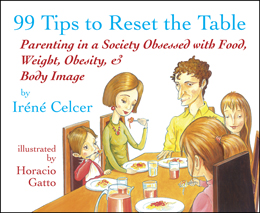 At age 14, Chloe becomes interested in boys and develops a crush on Jason. But Jason has a crush on Amanda. Her friends comment, “Amanda is so pretty and so thin!”
At age 14, Chloe becomes interested in boys and develops a crush on Jason. But Jason has a crush on Amanda. Her friends comment, “Amanda is so pretty and so thin!”
A couple of days later, Chloe decides goes on a diet. Chloe has gotten taller since she turned 12. Her weight is on target. ‘Don’t eating disorders start with dieting?’ her mother thinks. “I will get you fresh and good quality food,” she says.
Chloe begins dieting intently. She loses weight. Friends and Aunt Dottie congratulate her profusely. Something starts happening for Chloe. Dieting becomes her most important activity. Deep down, Chloe believes that being thin will grant her admiration and, Jason.1
Does Chloe have an eating disorder? Not yet. As a parent be vigilant!
In this cultural climate, it may go either way. Dieting may be a momentary developmental way of coping with life stressors or it may become a permanent way of doing so. At this point of the game you cannot be sure. Insecure, anxious, depressed or stressed teens may try to deal with problems consciously and unconsciously by dieting them away because eating problems are never about food alone.
Signs Your Teenager is Having an Eating Problem (Not an Eating Disorder)
1) Your daughter starts dieting and becomes hyper focused on dieting.
2) Once she gets to her goal weight, she does not seem happy or appreciative.
3) Your son asks to eat in his room with one or another excuse: not feeling well, the need to be alone – more or less consistently.
4) She/he is never hungry, no matter the activity she has done.
5) Portions seem way to small to you.
6) Although she/he is keeping up with all grades and activities, you can see that dieting is occupying more and more of her/his time.
7) One day she/he eats normally but on others, diets severely.
8) You, as a mother, feel confused.
9) She/he wants to achieve a celebrity’s weight that sends chills down your spine.
10) Her new exercise regime seems to be a bit much, but you are uncertain.
What To Do
1) Talk to your daughter about the possibility of her feeling upset about issues in her life.
2) Offer him/her someone to talk to. A therapist can often be most helpful.
3) Tell him/her that diets should have a beginning, a middle stage and an end.
4) Do not disqualify his/her dieting.
5) Let him/her know that respecting stomach hunger is healthy and normal.
6) Do not treat losing weight as a huge success (as her friends or Aunt Dottie do.)
7) Let him/her know that, to you, they look great, always!
8) Let him/her know that there is not only one-way to be beautiful.
9) Tell him/her that food labels are not always accurate because their purpose is commercial.
10) Keep an eye on how things develop.
11) Do not criticize her dieting but let them know that there is a point where it is unhealthy to lose any more weight.
12) Offer a nutritionist so he can maintain the weight without gaining or being unhealthy.
13) Do not make a huge deal if he/she wants salad. “There is cottage cheese available” say plainly.
14) Seek the help of a therapist if the issue becomes too much for you and your partner.
Conclusion
Your daughter began dieting intending to lose a couple of pounds but is has become too much of an emotional crutch. Make sure she gets help early by seeing a therapist and a nutritionist so she can discuss her feelings and ways to eat healthy so the problem does not become a disorder.
* Chloe is a fictional made-up character, not a real teenager.
1 This article is based on the book, Just a Little Too Thin, by Michael Stroeber, PhD & Meg Schneider LCSW, (LifeLong Perseus Group 2006). This is a Must Read book for parents and professionals.
 Iréné Celcer, 56, has extensive experience working internationally with men, women, and children who suffer from obesity, body image disturbances and eating disorders. She is a regular guest at CNN where she talks about her specialties on food and disordered eating, parenting and bullying. Iréné holds graduate degrees in psychology from Universidad de Belgrano, Argentina; Holistic Psychologyfrom Antioch University, San Francisco; and Social Work from Yeshiva University, New York. She is is the author of the collection of books Hope & Will Have a Baby (Graphite Press, 2007, 2010), 99 Tips to Reset the Table: Parenting in a Society Obsessed with Food, Weight, Obesity, & Body Body Image (Graphite Press 2015). She is also the author of some books in Spanish: Mujer, Cuerpo, Dieta? La Voz de La Obsesion Women, Their Bodies & Dieting: The Voice of an Obsession (Vinciguerra 1996) and La Tirania de las Dietas/The Tyranny (Planeta 1994). She is mom to a 15 year old.
Iréné Celcer, 56, has extensive experience working internationally with men, women, and children who suffer from obesity, body image disturbances and eating disorders. She is a regular guest at CNN where she talks about her specialties on food and disordered eating, parenting and bullying. Iréné holds graduate degrees in psychology from Universidad de Belgrano, Argentina; Holistic Psychologyfrom Antioch University, San Francisco; and Social Work from Yeshiva University, New York. She is is the author of the collection of books Hope & Will Have a Baby (Graphite Press, 2007, 2010), 99 Tips to Reset the Table: Parenting in a Society Obsessed with Food, Weight, Obesity, & Body Body Image (Graphite Press 2015). She is also the author of some books in Spanish: Mujer, Cuerpo, Dieta? La Voz de La Obsesion Women, Their Bodies & Dieting: The Voice of an Obsession (Vinciguerra 1996) and La Tirania de las Dietas/The Tyranny (Planeta 1994). She is mom to a 15 year old.
